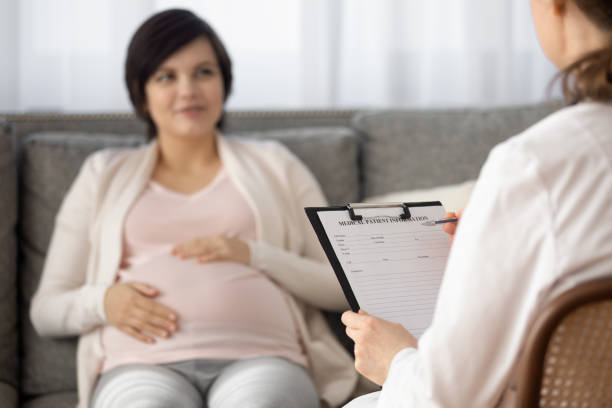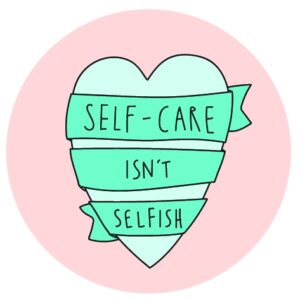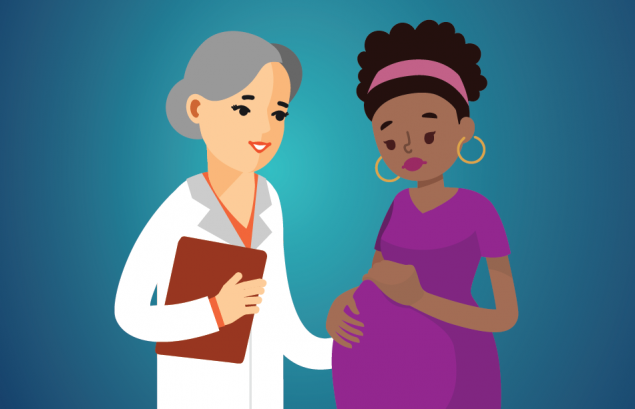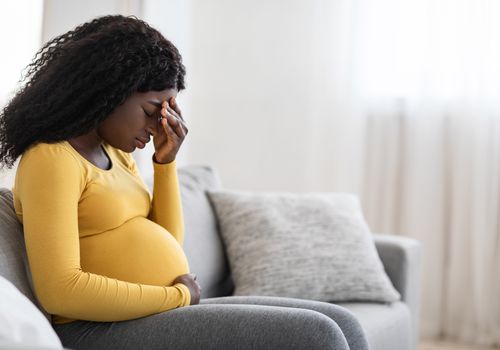If you are pregnant or considering becoming pregnant, you may be experiencing pregnancy anxiety. This is completely normal and understandable! Pregnancy can be a scary time, especially if it is your first time. There are a lot of things to worry about, from the health of your baby to whether or not you will be able to handle being a mom. In this blog post, we will discuss pregnancy anxiety and what you need to know about it. We will also provide some tips for how to manage your anxiety during this time.
Contents
- 1 What Is Pregnancy Anxiety?
- 2 What Are the Symptoms of Pregnancy Anxiety?
- 3 What Causes Pregnancy Anxiety?
- 4 Pregnancy Anxiety At Night
- 5 Pregnancy Anxiety and Depression
- 6 Impacts of Pregnancy Anxiety
- 7 How To Treat Pregnancy Anxiety?
- 8 Can Pregnancy Anxiety Be Prevented?
- 9 Can Someone Help Others With Pregnancy Anxiety?
- 10 Conclusion
What Is Pregnancy Anxiety?
 Pregnancy anxiety is a form of anxiety that can occur during pregnancy. It is characterized by worry or fear about the health and well-being of the pregnant woman and her baby. Pregnancy anxiety can range from mild to severe and can interfere with a woman’s ability to function daily.
Pregnancy anxiety is a form of anxiety that can occur during pregnancy. It is characterized by worry or fear about the health and well-being of the pregnant woman and her baby. Pregnancy anxiety can range from mild to severe and can interfere with a woman’s ability to function daily.
Pregnancy anxiety is thought to be caused by hormonal changes, fatigue, stress, and other factors. However, the exact cause is unknown. Treatment for pregnancy anxiety typically includes counseling and support groups. Some women may also need medication to help manage their symptoms.
The occurrence of pregnancy anxiety is thought to be relatively common. A study published in the journal Obstetrics & Gynecology found that nearly one-third of pregnant women reported experiencing anxiety during pregnancy.
Pregnancy anxiety can be a difficult and overwhelming experience. If you are struggling with anxiety during pregnancy, it is important to seek help from your healthcare provider or mental health professional. There are many resources available to help you cope with your symptoms and manage your anxiety. You are not alone in this journey.
What Are the Symptoms of Pregnancy Anxiety?

Pregnancy anxiety can cause a variety of physical, emotional, and behavioral symptoms. These symptoms can range from mild to severe and can vary from woman to woman. Some common symptoms of pregnancy anxiety include:
Feeling Restless, Irritable, or On Edge
One of the most common symptoms of pregnancy anxiety is feeling restless, irritable, or on edge. This can manifest itself in several ways, including difficulty concentrating, being easily frustrated or angered, and feeling like you’re in a constant state of stress.
Feeling Excessively Worried or Fearful
Another common symptom of pregnancy anxiety is feeling excessively worried or fearful. This may be about the health of your baby, the changes that are happening to your body, or the challenges of parenthood. You may find yourself constantly worrying about things that could go wrong during pregnancy or after childbirth.
Having Trouble Sleeping
Pregnancy anxiety can also cause difficulty sleeping. This may be due to worry about the future or about your ability to care for a baby. You may have trouble falling asleep or staying asleep, and you may find yourself waking up frequently during the night.
Experiencing Physical Symptoms
Pregnancy anxiety can also cause physical symptoms, such as headaches, stomachaches, and muscle tension. You may also feel shortness of breath, dizziness, or nausea. These physical symptoms can be caused by stress and can make it difficult to concentrate or function normally.
Having a Hard Time Concentrating or Thinking Clearly
This sign of pregnancy anxiety can be one of the most frustrating and debilitating. You may find yourself having a hard time focusing on anything, or you may have difficulty thinking clearly. This can make it difficult to complete simple tasks, follow conversations, or remember important information.
Avoiding People or Situations That Make You Anxious
People may also start to avoid people or situations that make them anxious. This may mean avoiding social gatherings, working, or even leaving the house. In severe cases, people may become so isolated that they only leave the house for necessary errands and appointments.
Feeling Hopeless or Helpless
Pregnancy anxiety can also cause feelings of hopelessness and helplessness. You may feel like there’s nothing you can do to control your anxiety or like you’re powerless to change the situation. This can be a very difficult feeling to manage and can lead to depression.
If you’re experiencing any of these symptoms, it’s important to talk to your doctor or midwife. Pregnancy anxiety is a common condition, but it’s also one that can be managed with
What Causes Pregnancy Anxiety?

There is no single cause of pregnancy anxiety. Instead, it is thought to be caused by a combination of physical, emotional, and hormonal changes.
Physical Changes
One of the main physical changes that can contribute to pregnancy anxiety is the increased level of hormones in your body. During pregnancy, your body produces higher levels of progesterone and estrogen. These hormones can cause a variety of physical and emotional changes, which can be difficult to adjust to. In addition, the physical changes that occur during pregnancy can also be overwhelming. These changes can include weight gain, nausea, fatigue, and back pain. All of these factors can contribute to feelings of anxiety.
Emotional Changes
In addition to the physical changes that occur during pregnancy, there are also many emotional changes. For example, you may be worried about the health of your baby or about how you will cope with motherhood. You may also feel overwhelmed by the responsibility of caring for a child. These emotional changes can be difficult to adjust to and can lead to anxiety. These emotional changes can also be exacerbated by the hormonal changes that occur during pregnancy.
Hormonal Changes
As mentioned above, one of the main physical changes that can contribute to pregnancy anxiety is the increased level of hormones in your body. During pregnancy, your body produces higher levels of progesterone and estrogen. These hormones can cause a variety of physical and emotional changes, which can be difficult to adjust to. In addition, the hormonal changes that occur during pregnancy can also lead to mood swings and irritability. This can further contribute to feelings of anxiety.
Pregnancy Anxiety At Night
Pregnancy anxiety at night is very common. Many women feel anxious about their pregnancy and the health of their babies. This anxiety can cause sleepless nights and restless days.
Sometimes at night, you have many strange and vivid dreams. These dreams may be related to your anxiety or they may be completely unrelated. Often, these dreams are so real that you wake up feeling scared or worried.
There may be many things that you are anxious about. You may be worried about the health of your baby, the pain of labor, or the changes that parenthood will bring. It is common to feel overwhelmed and unsure about what the future holds.
At night, your mind is more active and open to new ideas. This can be a great time to reflect on your worries and develop a plan to address them. Write down your thoughts and concerns, and then brainstorm some possible solutions. This will help you feel more in control and may ease your anxiety.
If you are struggling with pregnancy anxiety, please know that you are not alone. Many women experience this type of anxiety during pregnancy. Reach out to your doctor or a support group for help. You deserve to enjoy this special time in your life, without worrying about every little thing. Relax, take deep breaths, and believe that everything will be okay in the end.
Pregnancy Anxiety and Depression
Pregnancy anxiety and depression are very common. It’s something that a lot of women experience during pregnancy, and it can be tough to deal with. If you’re feeling anxious or depressed, know that you’re not alone. There are things you can do to help ease your symptoms.
The relationship between pregnancy and anxiety is complicated. For some women, anxiety is a normal part of pregnancy. They may worry about things like their baby’s health, the labor and delivery process, or whether they’ll be able to handle motherhood. This type of anxiety is called perinatal anxiety, and it’s perfectly normal. Research suggests that up to 25 percent of pregnant women experience perinatal anxiety.
For other women, anxiety may be more than just a normal part of pregnancy. They may have an anxiety disorder, such as generalized anxiety disorder (GAD), panic disorder, social anxiety disorder, or post-traumatic stress disorder (PTSD). According to the American Psychiatric Association (APA), up to 20 percent of pregnant women and 13 percent of new mothers experience an anxiety disorder.
Pregnancy can also trigger depression. The APA estimates that up to 20 percent of pregnant women and 26 percent of new mothers experience depression. Depression is more than just feeling sad or down. It’s a serious condition that can make it hard to function in your day-to-day life.
If you’re struggling with anxiety or depression during pregnancy, tell your doctor or midwife. They can help you find ways to manage your symptoms and get the treatment you need. You don’t have to go through this alone.
Impacts of Pregnancy Anxiety
 Sometimes, the physical symptoms of anxiety during pregnancy can be mistaken for other common pregnancy discomforts, like nausea or indigestion. It’s important to understand the difference so you can get the proper treatment.
Sometimes, the physical symptoms of anxiety during pregnancy can be mistaken for other common pregnancy discomforts, like nausea or indigestion. It’s important to understand the difference so you can get the proper treatment.
Pregnancy anxiety can also lead to emotional symptoms. You may find yourself feeling more weepy or sensitive than usual. You may also have a hard time sleeping, which can make the anxiety worse.
Untreated pregnancy anxiety can have an impact on your baby. Research shows that high levels of stress hormones in pregnant women can lead to preterm labor, low birth weight, and developmental problems in babies.
Sometimes preterm labor can be prevented with medication and other interventions, but it’s always best to try to avoid it if possible.
The good news is that pregnancy anxiety is treatable. If you’re struggling, talk to your doctor about your options. There are several effective treatments available, including therapy, medication, and relaxation techniques.
With the right treatment, you can manage your anxiety and have a healthy pregnancy.
How To Treat Pregnancy Anxiety?

Treating pregnancy anxiety can be a tricky thing. You want to make sure that you are not taking any medications that could potentially harm the baby. You also want to find something that is going to work for you and help to ease your anxiety. Here are a few things that you can do to help treat your pregnancy anxiety:
Medications
Although medications are generally not recommended during pregnancy, some can be used to help ease anxiety. If you and your doctor feel that medications are the best option for you, they will likely prescribe a low-dose anti-anxiety medication. Some of these medications include:
-Benzodiazepines: These medications can help to ease anxiety and promote relaxation. However, they can also be addictive and should only be used short term.
-Tricyclic antidepressants: These medications are typically used to treat depression but can also be effective in treating anxiety. They can have some side effects, so they should be used with caution.
-Selective serotonin reuptake inhibitors (SSRIs): These medications are commonly used to treat depression but can also be helpful for anxiety. They may take a few weeks to start working and may cause some side effects, such as nausea, headaches, and insomnia.
Therapy
Therapy is another option that can be very effective in treating anxiety. It can help you to understand your anxiety and learn how to manage it. Different types of therapy can be used, such as cognitive-behavioral therapy, which can help you to change the way you think about and react to situations that cause anxiety. Some types of these therapies are:
-Cognitive-behavioral therapy: This type of therapy can help you to change the way you think about and react to situations that cause anxiety.
-Exposure therapy: This type of therapy involves gradually exposing yourself to the things that cause anxiety. This can help you to learn how to manage your anxiety and eventually overcome it.
-Behavioral therapy: This type of therapy focuses on changing the way you react to situations that cause anxiety. It can help you to learn new coping skills and ways of dealing with anxious situations.
Some of these therapies are conducted in a group setting, while others are conducted one-on-one. If you are interested in pursuing therapy, speak with your doctor or a mental health professional to see what might be the best option for you.
Self-care
 Taking care of yourself is also important when it comes to managing anxiety. Some of these self-care practices are:
Taking care of yourself is also important when it comes to managing anxiety. Some of these self-care practices are:
Exercise: Exercise is a great way to reduce stress and anxiety. It can help to release endorphins, which can improve your mood. It is important to find an exercise routine that works for you and that you enjoy. This could be something as simple as going for walks or taking yoga classes.
Diet: Eating a healthy diet is important for overall health, but it can also impact anxiety levels. Eating foods that are high in sugar and processed carbohydrates can cause blood sugar levels to fluctuate, which can lead to anxiety. Eating plenty of fruits, vegetables, and whole grains can help to keep blood sugar levels stable and ease anxiety.
Sleep: Getting enough sleep is important for managing anxiety. When you are well-rested, you are better able to deal with stress and manage your emotions. aim for at least eight hours of sleep each night.
Stress management: Learning how to manage stress is also important for managing anxiety. This could involve practices such as meditation, relaxation techniques, or journaling. Finding what works best for you and incorporating it into your daily life can help to reduce stress levels and ease anxiety.
Support Groups
Another option that can help manage anxiety is to join a support group. This can provide you with a space to share your experiences and feelings with others who understand what you are going through. It can also be helpful to hear how others are coping with anxiety and learn new coping skills. There are many different types of support groups, so it is important to find one that meets your needs.
These support groups are also a great way to connect with others who are going through similar experiences. This can help you to feel less alone and provide you with a sense of community.
Can Pregnancy Anxiety Be Prevented?

Preventing pregnancy anxiety is not always possible. However, some things can help lower your risk:
Talk to your doctor about your anxiety
This is one of the most important things you can do. Your doctor can help you figure out if your anxiety is normal or something more serious. They can also offer suggestions on how to deal with your anxiety. Sometimes, medication may be necessary.
Make time for relaxation
It’s important to find ways to relax and de-stress. This might include yoga, meditation, or simply taking some time each day to read or take a bath. These relaxation activities can help lower your anxiety levels.
Talk To Another Pregnant Woman
You should always talk to your doctor about your anxiety. However, it can also be helpful to talk to another pregnant woman. This can help you feel less alone and give you some ideas on how to deal with pregnancy anxiety.
Pregnancy is a time of many changes, both physically and emotionally. It’s normal to feel anxious during this time. However, for some women, anxiety can be more severe. If you are feeling overwhelmed by anxiety, please talk to your doctor. There are treatments available that can help relieve your symptoms and allow you to enjoy this special time in your life.
Can Someone Help Others With Pregnancy Anxiety?
Helping someone with anxiety can be difficult. It is important to remember that everyone experiences anxiety differently, so what works for one person might not work for another. However, there are some general things you can do to help someone who is struggling with pregnancy anxiety.
The first step is to try to understand what the person is going through. This can be difficult, as symptoms of anxiety can vary greatly from person to person. However, it is important to remember that everyone experiences anxiety differently, so what works for one person might not work for another. If you can understand what the person is going through, it will be easier to help them.
Once you have a better understanding of the situation, you can start to offer support. This can be in the form of practical help, such as helping to organize their thoughts or providing information about pregnancy and anxiety. You can also offer emotional support, such as listening to their concerns and offering reassurance.
Sometimes, the best thing you can do is simply be there for the person. This can be a great source of support, as it can help them feel less alone and more understood. Just being willing to listen and offer support can make a big difference.
If you are struggling to help someone with pregnancy anxiety, there are many resources available that can offer more information and support. You can talk to your doctor or midwife, or contact organizations.
Conclusion
Pregnant women should not feel like they have to suffer through pregnancy anxiety alone. If you are feeling anxious, talk to your doctor or midwife. There are a variety of treatments that can help relieve anxiety during pregnancy. Remember, you are not alone and there is help available.
Pregnancy can be an exciting time, but it can also be full of uncertainty and anxiety. If you’re feeling anxious about your pregnancy, don’t hesitate to reach out for help. You deserve to enjoy this special time in your life, and there is no shame in seeking treatment for anxiety. With the right support, you can overcome anything.
Hope this article was of help to you! If you are suffering from anxiety, you may seek help from Therapy Mantra. We have a team of highly trained and experienced therapists who can provide you with the tools and skills necessary for overcoming anxiety. Contact us today to schedule an online therapy or download our free Android or iOS app for more information.


